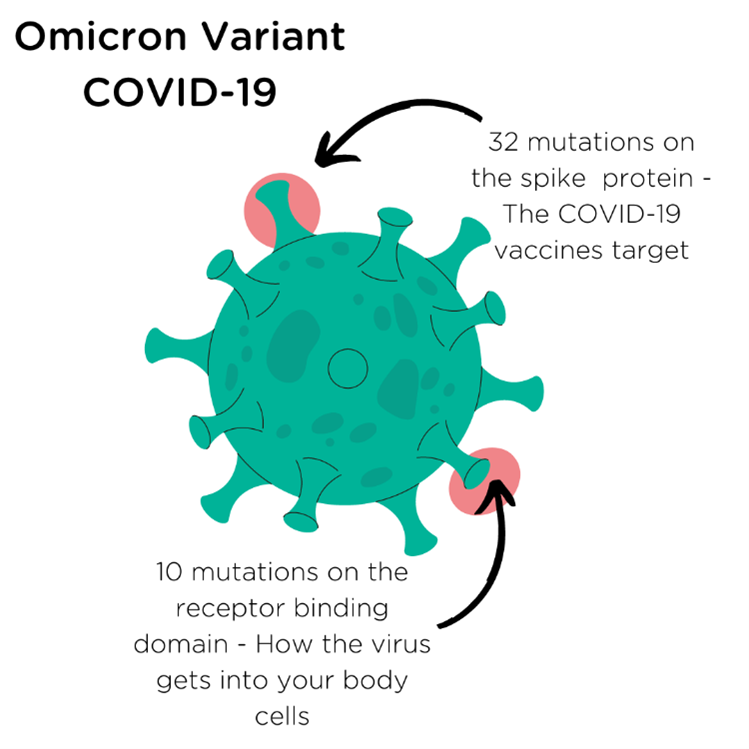Omicron - The Latest COVID-19 Variant: Should I be Worried?
A new COVID-19 variant originating from South Africa is making headlines due to its large number of mutations and the risk they pose. Designated as a ‘variant of concern’ by WHO, how worried do we need to be about the Omicron variant, and what do you need to be aware of?
How serious is the Omicron variant?
News articles have sprung forth in advance of any solid research, which means that whilst there is data about how Omicron is spreading, we don’t know much about the risks of this variant.
The term ‘Variant of Concern (VOC)’ sounds intimidating, but it is simply the terminology used by WHO to indicate variants where the genetic changes that have taken place are known to affect the characteristics of the virus, such as transmissibility or disease severity and therefore its significance in terms of global public health.
There have been 4 Variants of Concern so far in the pandemic, the previous iteration being the Delta variant. All three of the previous VOC’s were labelled as such because there was evidence that they had increased transmissibility (ie they spread faster), were able to evade some of the immune responses established via previous infection or vaccination, and produced more severe symptoms in those who tested positive.
Despite this trend, the Omicron variant may not show the same characteristics. Anecdotal evidence from South Africa suggests that the symptoms of this variant are mild, however more research is required to establish how vulnerable individuals will react to the strain.
What makes the Omicron variant different?

The Omicron variant has 50 mutations differentiating it from the initial COVID-19 variant that emerged in Wuhan in 2019, of which 32 are on the spike protein. The spike protein is the largest of the 4 major structural proteins that are found in coronaviruses’, and it is the part of the virus responsible for the virus’s ability to establish an infection in an individual– at which point you start to feel ill. The spike protein is the typical target of most vaccines.
On the receptor binding domain which is the part making first contact with your body cells scientists have found 10 of those 50 mutations, a significant increase from the two found in this area on the Delta variant.
Whilst we do not know yet exactly what effect these mutations will have, they are in locations which are known to be associated with changes in how transmissible the virus is, the severity of symptoms, and ‘immune escape’ (how good the virus is at avoiding your bodies immune system) therefore WHO are treating this variant seriously, until there is evidence to suggest otherwise.
How effective are the current vaccines against the Omicron variant?
Omicron has more mutations than scientists were anticipating, and there is a chance that such mutations mean that COVID-19 vaccines are less effective. “This variant did surprise us, it has a big jump on evolution [and] many more mutations than we expected” – Professor Tulio de Oliveira.
All the COVID-19 vaccines in use in the UK were developed to target the original Wuhan strain, therefore their effectiveness in protecting people from a significantly altered virus like the Omicron variant is not yet known. Studies are underway worldwide to monitor the rates of Omicron infection in vaccinated individuals and to give us some answers to this question.
Am I more likely to catch the Omicron variant? Is it more transmissible?
Initial evidence from WHO (the World Health Organisation), which is preliminary and requires further investigation, suggests that reinfection is more likely with Omicron.
The emerging picture indicates that this variant may also be more transmissible, suggested by the surge of cases in South Africa. PCR and lateral flow tests are effective at detecting this variant and should be used to ensure you know whether or not you have contracted any variant of COVID-19.
There is a silver lining in terms of researching this variant. It is much easier to identify. PCR tests, which are used to identify people who have contracted COVID-19 look for three different genes. One of these three genes is not detected in the Omicron variant, known as S gene dropout, providing a very easy marker to look for in rapidly identifying this variant. This means that it can be tracked more effectively, and individuals can be quickly alerted that they have contracted the Omicron variant.
Should I be shielding?
Current advice in the UK does not indicate a need to shield, however individuals who have come into contract with a person suspected to have the Omicron variant will be alerted and must isolate for 10 days, regardless of their vaccination status.
Are the current COVID-19 treatments still effective?
The bulk of the mutations designating Omicron as a VOC are found on the spike protein. Antiviral drugs such as Lageviro (Molnupiravir) do not target this protein, therefore will still be effective in treating this variant however there is a risk that Ronapreve may be less effective as it targets areas of the virus which have mutated in Omicron.
Treatments beyond antivirals, such as steroids and receptor targets which target the immune system to dampen inflammation in people with severe infection will continue to be effective against this strain, and remain in the UK’s treatment arsenal.
When will we know how serious Omicron is?
Very simply, right now we don’t know. Scientists across the globe are working as fast as possible to understand more about the biology of this new variant, therefore to provide us with a more sophisticated idea of exactly how this variant effects people will emerge.
In the meantime, we encourage you to follow advice from the government relating to social distancing and shielding and to take advantage of any vaccines you are offered – third doses or boosters.
